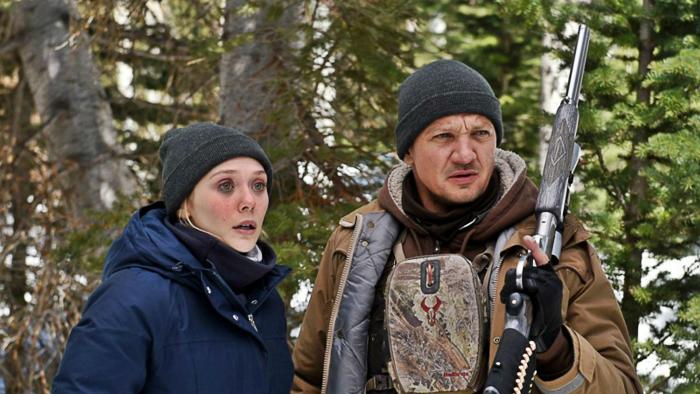
On paper, it’s easy to write off Wind River as another police procedural. Its core elements (dead girl, snowy setting, city cop in the country) are hardly unique, yet the movie manages to create something fresh and affecting out of its well-worn parts.
Cory Lambert (Jeremy Renner) is among the white minority living on Wyoming’s Wind River Indian Reservation, making his living hunting local predators that threaten the citizens’ livestock. Recently divorced after losing his daughter three years ago, he finds solace in his job and his relationship with his half Native American son. While tracking a mountain lion through the woods, he discovers the beaten and raped body of Natalie Hanson, a local 18-year-old. Due to a technicality, the Medical Examiner refuses to document it as a homicide, leaving Jane Banner (Elizabeth Olsen), the FBI liaison assigned to the case, without support from her superiors. After she joins forces with Cory and the local tribal police chief, the trio sets out to solve Natalie’s murder.
Standard stuff, right? Hardly. Though Wind River’s setup is admittedly conventional, it’s in the service of an uncommonly well-told story. The murder mystery at its core hooks the viewer immediately, and the pacing is perfectly measured, constantly moving the story forward without ever sacrificing depth. Also masterful is the way the movie slowly builds the tension to its absolute breaking point, finally providing a release in the form of an explosive, yet justified, climax.
But this a movie that’s just as much about its setting – the cold and desolate Wyoming wilderness, breathtakingly captured by aerial cinematography – as the story it tells there. It clearly has ideas on modern day Native America and male identity, but it conveys them with an uncommonly light touch. There are no clunky asides or preachy monologues here; instead the movie trusts both its own ability and its audience enough to advance these points without ever sacrificing immersion.
Wind River’s third essential ingredient is character. As Cory, Jeremy Renner embodies the old-school masculinity of the strong, silent type without ever slipping into caricature. He manages to inspire the same reverence commanded by cowboy heroes of old while still creating a flawed, human character. Elizabeth Olsen is also excellent as the oft-token female presence in the film, her city-mouse agent unfamiliar with her surroundings but never naïve, and the bond the two forge over the course of the film provides a glimmer of hope among the disturbing subject matter.
Though often as stark and unforgiving as the Wyoming winter in which it takes place, Wind River is by no means an empty exercise in suffering and violence. It’s far more meditative than that, offering no easy moral answers to its heavy questions. And while it never shies away from the ugliest depths of humanity; it has an undeniable, haunting beauty as well.
[…] Renner and Elizabeth Olsen deliver powerfully restrained performances in the lead roles. See my review for […]